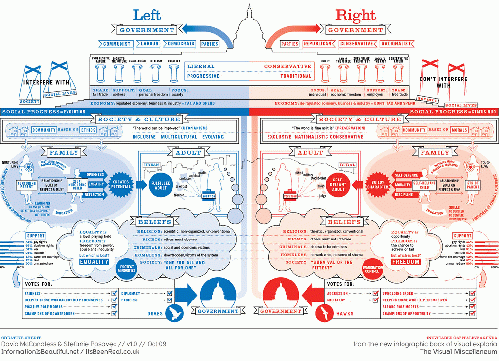Part I -- Spectrum Reality
Those who pay attention to mental and emotional states, and their multitude of disquieting effects, recognize the notion of a spectrum. For instance, autism is not a one-size-fits-all condition. Some people who are diagnosed with autism function pretty well, getting along in society, while others cannot successfully function without assistance. In other words there is a spectrum of autistic behavior. Another example comes through in large studies looking at family histories of those diagnosed with schizophrenia. Here it has been noticed that such families often have members with eccentric behavior showing up in a sporadic fashion. These folks are not schizophrenic and they are socially functional, but nonetheless not exactly "normal." Again, there is a spectrum when it comes to mental states.
We can apply this same concept to what we call rationality. Just as is the case with "sanity," the notion of rationality covers a lot of territory. It would be a mistake -- actually you would have to gloss over a lot of history -- to just claim humans are all "homo sapiens" or "wise people" and leave it at that.Part
Part II -- A Spectrum For Rationality
A spectrum along which to rank alleged rational behavior and decision making has to take into consideration context. Thus, within Western "liberal" societies (there are, of course, many other types of societies), the context against which rational behavior is measured may not be uniform. For instance:
Context number 1 -- Where civic values are primarily capitalist ones, economics will play a dominant role in shaping alleged rational choices. The United States is the home of a stereotypical Wall Street mentality, and is idealized just because the country is seen, for better or worse, as a place where personal enrichment is a national goal. In such a context, other considerations such as honesty, promoting societal issues of fairness, doing away with racial prejudice and addressing environmental concerns may not be seen as important when compared to economic security or advancement. And this can influence choices when it comes to, say, political candidates and their policies.
C ontext number 2 -- On the other hand, in the same liberal societies, the context of civic values usually includes democratic standards and notions of right and wrong that do not consider economics as a singular, isolated, value. This context promotes, at least in theory, more or less ethically based regulatory standards and the concept of the rule of law. In this case, rational behavior would require consideration of more than personal advantage. It will demand choices attuned to idealized "community values." To the extent that the U.S. is such a liberal nation, it must promote such community values as equity, truthfulness and fairness.
In most cases, Americans believe that they take into consideration both contexts when making what they consider rational choices. But this is not always the case. And, in the last decade, the two contexts have become more distinct. Thus, how an American interprets his or her place on the spectrum of rationality may depend on which context they favor. If you adhere mostly to number 1, you will be less likely to see the value of the criteria put forth by number 2. You may, in fact, understand "rational" in terms of personal cost/benefit ratios. You may come to see the values represented in context 2 as obstacles to making rational choices. Just so, it may be hard for those adhering to context 2 to see the choices promoted by number 1 as truly rational if they stand alone and disregard other aspects of ethics and the greater community's well-being.
Part III -- Are Trump's Supporters Rational?
In the United States, the phenomenon of Donald Trump has made clear this relationship of rationality and context. You will often hear those who see as primary the values embedded in context number 2 ask the question, are Trump supporters really rational? There is more than one answer to this question. Certainly, those Trump supporters enmeshed in conspiracy theory thinking, racist white supremacy or pseudo Nazi ideologies, as well as radical Christian beliefs (i.e., Trump is God appointed) can be considered so out of touch with reality that it is hard to see their thought and political choices as rational. And, indeed, there may be millions of Americans who see the world in such distorted ways -- because of such beliefs, they are off the rationality spectrum altogether.
However, in the 2020 election, some 71 million American voters supported Donald Trump. And, as Nesrine Malik puts it in a 11 November 2020 essay in The Correspondent, "ignorance and immorality [or, if you will, irrationality] simply cannot account for 71 million votes."
Malik believes that it is important for those who did not support Donald Trump to recognize that some Trump supporters are "rational." However, it would appear to be a rationality based exclusively on context number 1 -- the one where decisions are made for immediate economic, self-interested reasons.
Malik goes on to give examples of "rational" Trump voters:
(Note: You can view every article as one long page if you sign up as an Advocate Member, or higher).





